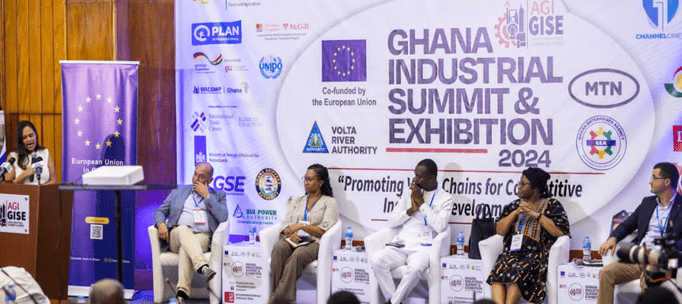By Buertey Francis BORYOR
A panellist at the 2024 European Union (EU) Session of the Ghana Industrial Summit and Exhibition (GISE) has accentuated an urgent need to harness the Black Volta River for irrigation to support farmers in the Upper West Region undertake year-round crop production.
Deputy Managing Director-Antika Company Ltd. Seidu Mubarak Abdulai, one of the panellists, noted that the Black Volta River can boost irrigation in the Upper West Region if the right investment is made.
Speaking on the topic ‘Opportunities and challenges for industrial development and digitalisation of the agribusiness sector in Ghana’, Mr. Abdulai described the river as the region’s largest natural resource and stressed that harnessing it for irrigation would help address the country’s perennial food supply shortfalls and ensure long-term food security.
“In the Upper West Region alone, this year we have about 70 percent of the maize fields being affected by the drought; and with groundnut, we have about 40 percent being affected. The Black Volta is the biggest natural resource in terms of water and value for those of us living in the Upper West.
We are calling on government to step in immediately to assist us in developing the Black Volta for irrigation, so that farmers can irrigate their farms to ensure all year-round cultivation,” he elaborated.
Additionally, he stressed the importance of farmers forming unions and cooperatives. “Forming cooperatives is very important. If we are able to have stronger farmer unions and farmer organisations within the agriculture space, I am very sure that banks and financial institutions would gladly want to invest with us within the spaces and activities that we are doing.”
Also, he appealed for government to assist in coordinating individual actors’ activities within the agriculture space through the Agribusiness Desk at the Ministry of Food and Agriculture.
“We often witness infighting due to issues of trust, but I believe the Agribusiness Desk could help coordinate and unify us,” he noted.
Meanwhile, Irchad Razaaly – the European Union Ambassador to Ghana – in a press release issued after the event stated: “Our experience at the European Union clearly shows the impact digitalisation is having on various industries; and agribusiness is no different. Agriculture is one of the major priorities for Ghana-EU partnerships, with over €144million committed to Ghana by the EU toward enhancing sustainable agriculture since 2021.
“For 5 years running, the European Union has been a major partner of the Ghana Industrial Summit & Exhibition because it invests in private sector development and entrepreneurship – which is one more major priority of our partnership with Ghana.”

Dr. Humphrey Ayim-Darke, President-AGI, also noted: “We need proactive policies to ensure that agriculture and raw materials remain central to the promotion of competitive value chains. Equally important are other value chains such as textiles, pharmaceutical, iron, bauxite and automobiles – of which about five automobile companies are growing their value chains, which needs promotion.
“Some of the automobile parts can be produced locally to save us forex while creating jobs. In the case of textiles, we need to deepen the value chains from the cotton production stage to the production of yarn as raw materials for the textile Industry.”
The seminar was under the theme ‘Promoting industrial development and digitalisation of the Ghanaian agribusiness sector: challenges and opportunities’, organised by the EU as part of its activities to support private sector development as well as trade and investment flows between the Union and this country. It was held in partnership with the Association of Ghana Industries (AGI) and EU-Ghana Agribusiness Platform.
It included presentations from top research scientists and findings of research focused on digitalising the agribusiness sub-sector.










